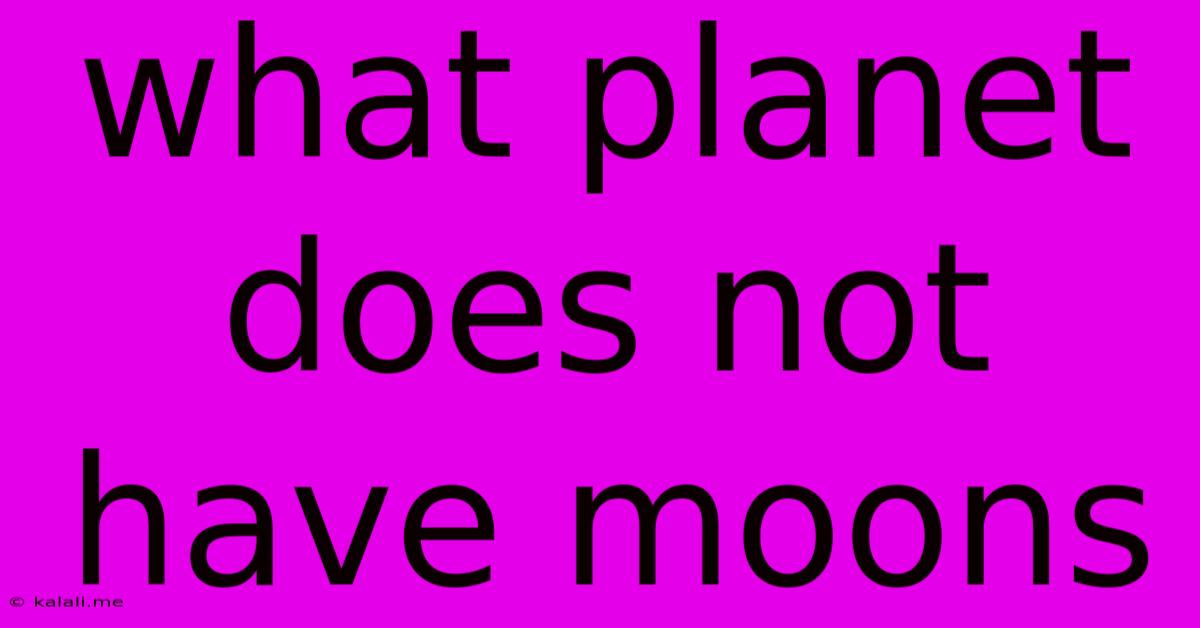What Planet Does Not Have Moons
Kalali
Jun 16, 2025 · 3 min read

Table of Contents
What Planet Doesn't Have Moons? A Surprisingly Simple Answer
So, you're curious about which planet in our solar system boasts the unique title of "moonless wonder"? The answer might surprise you, but it's a relatively straightforward one: Mercury and Venus. These two inner planets are the only ones in our solar system that don't have any natural satellites orbiting them. Let's delve deeper into the reasons why.
This article will explore the reasons behind this planetary peculiarity, looking at the gravitational forces at play, the formation of our solar system, and the implications of having (or not having) moons. We'll also touch upon some fascinating theories and ongoing research.
Why Don't Mercury and Venus Have Moons?
The absence of moons around Mercury and Venus is a complex issue, and there isn't one single, definitive answer. However, several leading theories attempt to explain this phenomenon:
-
Gravitational Influence of the Sun: The sun's immense gravitational pull is a significant factor. Being closer to the sun, the gravitational forces exerted by the sun overwhelm any weaker gravitational forces that might otherwise capture and hold a moon in orbit. Any small celestial body that might have been captured would likely be pulled into the sun or ejected from the system.
-
Formation Theories: The prevailing theories about the formation of planets suggest that moons often form from the debris left over from the planet's formation. This debris coalesces under the influence of gravity to form satellites. Some theories suggest that Mercury and Venus may have formed in a region of the early solar system where the density of this debris was insufficient to create moons. Alternatively, they might have experienced violent collisions that stripped away any potential moons.
-
Planetary Migration: There's also the possibility of planetary migration—where planets change their orbital positions over time. This could have resulted in the ejection of any moons Mercury and Venus might have initially possessed.
The Significance of Moons
The presence or absence of moons significantly impacts a planet's environment and evolution. Moons can:
-
Stabilize a planet's axial tilt: Our moon plays a crucial role in stabilizing Earth's tilt, leading to a relatively stable climate over geological timescales. The lack of such stabilization on Mercury and Venus could contribute to their extreme temperature fluctuations.
-
Influence tides: Moons create tidal forces, which can have a significant impact on a planet's oceans (if present), and even its internal geological activity.
-
Contribute to planetary rings: Some moons can contribute to the creation and maintenance of planetary ring systems. The lack of moons around Mercury and Venus means they lack such rings.
Ongoing Research and Future Discoveries
Our understanding of planetary formation and evolution is constantly evolving. Future research, including more sophisticated computer simulations and observations from space missions, may provide further insights into why Mercury and Venus lack moons. While the answer remains partially shrouded in the mysteries of our solar system's history, the prevailing theories offer a compelling explanation for this fascinating planetary difference.
The mystery of the moonless planets continues to intrigue scientists and amateur astronomers alike. The ongoing quest to unravel the secrets of our solar system's formation will undoubtedly shed more light on this intriguing aspect of planetary science.
Latest Posts
Latest Posts
-
Which Of The Following Best Describes A Body In Equilibrium
Jun 16, 2025
-
50 Of What Number Is 80
Jun 16, 2025
-
What Is The Si Unit Of Displacement
Jun 16, 2025
-
Lcm Of 6 4 And 10
Jun 16, 2025
-
Reactive Power Formula In 3 Phase
Jun 16, 2025
Related Post
Thank you for visiting our website which covers about What Planet Does Not Have Moons . We hope the information provided has been useful to you. Feel free to contact us if you have any questions or need further assistance. See you next time and don't miss to bookmark.